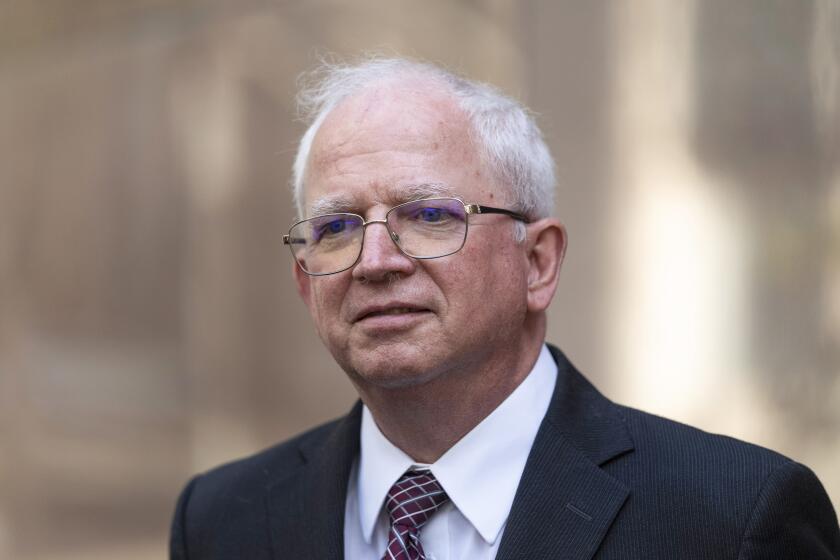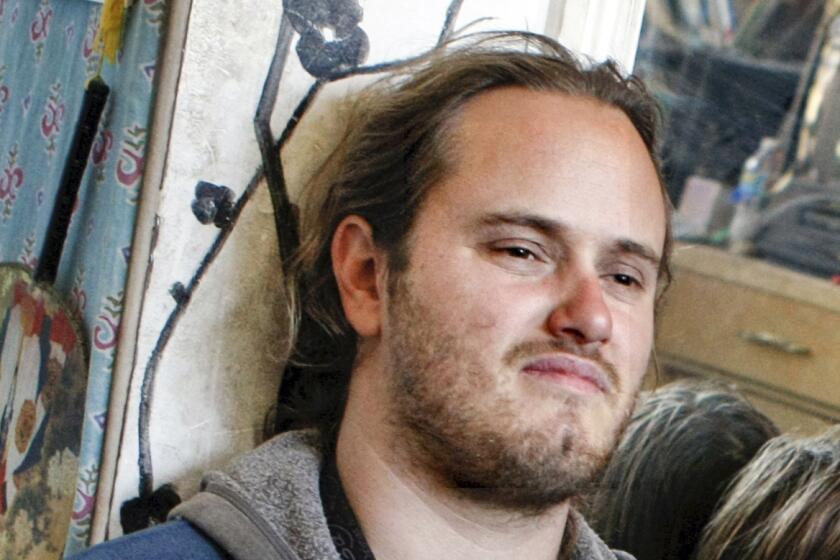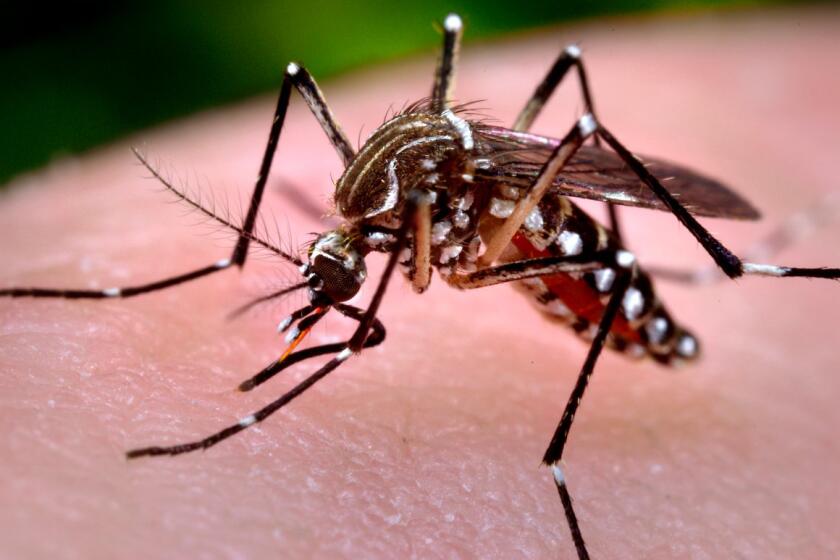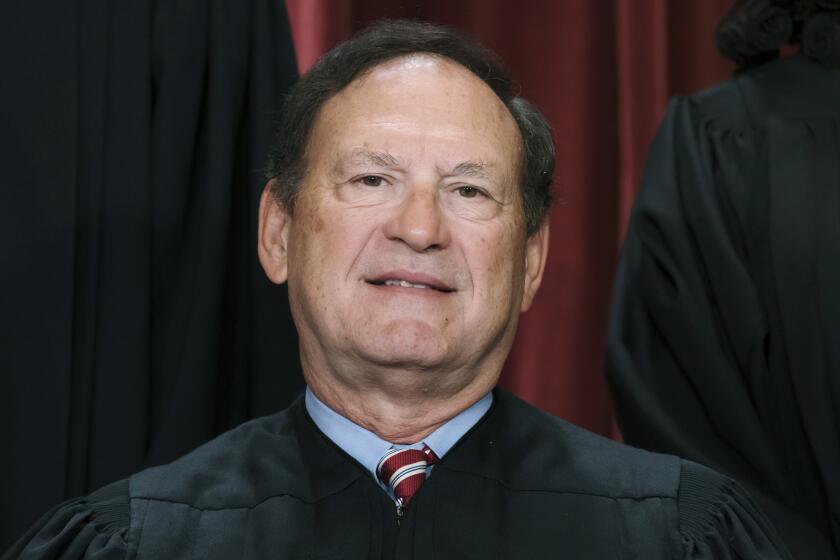Victims’ Bill Gets Backing
President Bush called Tuesday for a constitutional amendment to protect the rights of violent-crime victims, providing a key boost to advocates who have struggled for years to give victims equal footing with defendants in the courtroom.
Pushing a law-and-order message that has been a steady drumbeat of the administration, Bush and Atty. Gen. John Ashcroft told supporters at a Justice Department ceremony that the 8 million victims of violent crime each year have too often had their rights ignored in the criminal justice system. Establishing a bill of rights on their behalf, Bush said, “is one of those rare instances when amending the Constitution is the right thing to do.”
Key to the administration’s endorsement, according to government officials, was the assurance from Senate advocates that they would not seek to use the issue to limit presidential pardons, unlike in a similar effort that failed two years ago.
It was Ashcroft--then a senator from Missouri--who pushed through an amendment to the initiative in 2000 that would have forced the White House to notify the victims when considering a grant of clemency and to accept impact statements from the victims.
But no such restrictions are included in the new bipartisan proposal introduced Monday by Sens. Dianne Feinstein (D-Calif.) and Jon Kyl (R-Ariz.). In fact, the proposal specifically states that it does not affect the president’s authority to grant pardons.
The idea of a crime victims’ amendment still faces the threat of substantial opposition from politicians, particularly conservatives, who believe that the rights of victims can be protected through standard laws and that tinkering with the Constitution should only be considered as a last resort. During the debate two years ago that led to the defeat of the proposal, one senator chided supporters for “taking a roller to a Rembrandt.”
Passing an amendment to the Constitution, which would require a two-thirds vote of the Senate before it could go on to the House and the states for ratification, is a notoriously difficult proposition. Congress has considered more than 11,000 proposals to change the Constitution in the last 213 years, with only 28 amendments accepted.
Senate Judiciary Committee Chairman Patrick J. Leahy (D-Vt.), who opposed the initiative in 2000, is likely to schedule hearings on the issue, but he has not indicated any change in his stance so far.
Advocates for victims rights were clearly heartened by Bush’s strong words of approval, and they said the White House endorsement--following through on a pledge Bush made during his run for the White House in 2000--could tilt the balance in their favor. This is only the second time Bush has backed a constitutional amendment, after his support last year for a ban on flag-burning.
“This is about as good as it gets,” a beaming Feinstein said after she and other members of Congress, states’ attorneys general and victims’ crime advocates attended the Bush-Ashcroft event.
“America’s Most Wanted” host John Walsh, who became perhaps the country’s leading champion of victims’ rights after his 6-year-old son was abducted and murdered in Florida in 1981, said afterward that the support of the administration “is a milestone for victims’ rights. . . . Twenty years we’ve been working for this, and now we may finally get there.”
In 1996, President Clinton gave a general endorsement to the idea of a victims’ rights amendment, but both Feinstein and Walsh said Tuesday that Clinton’s support appeared somewhat halfhearted and that he never followed up on it. However, they said they believe Bush will prove a true advocate.
The bill proposed by Feinstein and Kyl lays out seven procedural rights for violent-crime victims, including the right to reasonable and timely notice of court proceedings involving the crime; the right to notification about the release of the accused; the right to address the judge during court proceedings; and the right to have their safety considered.
“There were approximately 8 million victims of violent crime last year,” Ashcroft said, “but too often in the quest for justice, the rights of these victims have been overlooked or ignored. It is time--it is past time--to balance the scales of justice, to demand fairness and judicial integrity not just for the accused but for the aggrieved as well.”
The Bush administration has long sought to position itself as a champion of crime victims, making unusual accommodations last year to allow families of those killed in the 1995 Oklahoma City bombing to watch Timothy J. McVeigh’s execution via satellite.
The Sept. 11 terrorist attacks gave the issue an even higher profile. The Justice Department is again going to unusual lengths, this time to play the cockpit voice recorder tape later this week for the families of those killed in the Pennsylvania crash.
Some families of Sept. 11 victims, however, have attacked the Justice Department for the restrictions it originally placed on financial relief to survivors, forcing changes in the formula after an emotional debate. But Ashcroft said Tuesday that “this Justice Department is committed to putting the interests of victims and their families first.”
As part of Tuesday’s ceremony, Bush and Ashcroft gave out awards to eight individuals and organizations who they said have been committed to working for victims’ rights.
Among those honored was Sacramento chaplain Mindi Russell, who works with volunteer chaplains at area police departments, schools and other institutions to help victims.
Eleven minutes after the Sept. 11 attacks, Russell was paged by supervisors at the Red Cross and was flown in a military cargo plane to New York City, where she spent two weeks working with families and instructing 500 chaplains at the scene on mass disaster care.
The message she imparted to the chaplains on the scene was “to comfort and console, to do a lot more listening than talking,” Russell recounted after receiving her award.
Especially in the first few days after the attacks, family members on the scene “just wanted so badly to believe their loved ones were still alive,” she said. “We didn’t want to give them false hope, but we wanted to be there for them, to support them.”
More to Read
Get the L.A. Times Politics newsletter
Deeply reported insights into legislation, politics and policy from Sacramento, Washington and beyond. In your inbox three times per week.
You may occasionally receive promotional content from the Los Angeles Times.






